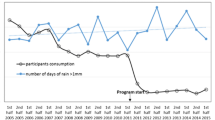Abstract
Effects of multiple types of water use efficiency appliances on long term water savings and water use trend shifts were analyzed. The study group included senior and low income families in the urban areas of Miami-Dade County, Florida, USA. The participants in the study group experienced continuous and significant water savings within 3 years of the implementation of the water conservation incentives. Water savings were observed at approximately 200 l per household per day, which is about 31 % reduction in household water demand in comparison to the average residential water demand within the County. The water use profile of participants showed noticeable shifts over time in water demand frequency curves toward lower water consumption rates. The cost-saving analysis showed that adoption of multiple water efficiency appliances contributed to the highest annual monetary savings (i.e., high water savings and moderate product costs). Future conservation program planning efforts should take both water savings and product cost into account in order to achieve the greatest benefits.




Similar content being viewed by others
References
Ahmad S, Prashar D (2010) Evaluating municipal water conservation policies using a dynamic simulation model. Water Resour Manage 24:3371–3395
Arnell NW, van Vuuren DP, Isaac M (2011) The implications of climate policy for the impacts of climate change on global water resources. Glob Environ Chang 21:592–603
Balbin M, Tansel B, Lee M (2010) Effectiveness of Miami-Dade water use efficiency program senior retrofit project: comparative analysis of water consumption rates and savings. Fla Water Resour J 62:14–15
Baumann DD, Boland JJ, Hanemann WM (1998) Urban water demand management and planning. McGraw-Hill, New York
Beal C, Steward RA, Huang T, Rey E (2011) SEQ residential end use study. Journal of the Australian Water Association 38:92–96
Berbel J, Martin-Ortega J, Mesa P (2011) A cost-effectiveness analysis of water-saving measures for the water framework directive: the case of the Guadalquivir river basin in southern Spain. Water Resour Manage 25(2):623–640
Campbell HE, Johnson RM, Larson EH (2004) Prices, devices, people, or rules: the relative effectiveness of policy instruments in water conservation1. Rev Policy Res 21:637–662
Cooley H, Christian-Smith J, Gleick PH, Cohen MJ, Heberger M, Ross N, Luu P (eds) (2010) California’s next million acre-feet: saving water, energy, and money. Pacific Institute, Oakland
Corral-Verdugo VC, Bechtel RB, Fraijo-Sing B (2003) Environmental beliefs and water conservation: An empirical study. J Environ Psychol 23:247–257
Fidar A, Memon FA, Butler D (2010) Environmental implications of water efficient microcomponents in residential buildings. Sci Total Environ 408:5828–5835
Inman D, Jeffrey P (2006) A review of residential water conservation tool performance and influences on implementation effectiveness. Urban Water J 3:127–143
Kenney DS, Goemans C, Klein R, Lowrey J, Reidy K (2008) Residential water demand management: Lessons from Aurora, Colorado. J Am Water Resour Assoc 44:192–207
Lee M, Tansel B (2012) Life cycle based analysis of demands and emissions for residential water-using appliances. J Environ Manage 101:75–81
Lee M, Tansel B, Balbin M (2011) Influence of residential water use efficiency measures on household water demand: a four year longitudual study. Resour Conserv Recy 56:1–6
Mayer PW, deOreo WB, Opitz EM, Kiefer JC, Davis WY, Dziegielewski B, Nelson JO (1999) Residential end uses of water. American Water Works Association Research Foundation and American Water Works Association, Denver
Mayer PW, Deoreo WB, Towler E, Lewis DM (2004) Tampa water department residential water conservation study: the impacts of high efficiency plumbing fixture retrotifs in single-family homes. Aquacraft Inc., Tampa
Miami Dade County Office of the Property Appraiser (2010) Property search. http://www.miamidade.gov/pa/property_search.asp
Miami Dade Water and Sewer Department (2013) Water rates, fees and charges as effective after October 1st, 2012. http://www.miamidade.gov/water/rates.asp#0
Millock K, Nauges C (2010) Household adoption of water-efficient equipment: the role of socio-economic factors, environmental attitudes and policy. Environ Resour Econ 46:539–565
Mohamed AS (2000) Water demand management in Egypt: policy objectives and strategy measures. J Phys Chem Earth B: Hydrol Oceans Atmos 25:243–249
Olmstead SM, Stavins RN (2009) Comparing price and nonprice approaches to urban water conservation. Water Resour Res 45:W04301. doi:10.1029/2008WR007227
Polycarpou A, Zacharizdis T (2013) An econometric analysis of residential water demand in Cyprus. Water Resour Manage 27(1):309–317
Postel SL, Daily GC, Ehrlich PR (1996) Human appropriation of renewable fresh water. Science 271:785–788
Randolph B, Troy P (2008) Attitudes to conservation and water consumption. Environ Sci Policy 11:441–455
Reed LK (2012) Capacity building as a policy instrument in water conservation: a case study on commercial, industrial, and institutional consumers. Water Resour Manag 26(13):3819–3829
Reidy K, Tejral J (2008) Aurora water 2008 conservation annual report. City of Aurora Government. https://www.auroragov.org/stellent/groups/public/documents/article-publication/035857.pdf2008
Russell S, Fielding K (2010) Water demand management research: a psychological perspective. Water Resour Res 46:W05302. doi:10.1029/2009WR008408
Saurií D (2003) Lights and shadows of urban water demand management: the case of the metropolitan region of Barcelona. Eur Plan Stud 11:229–243
Turner A, White S, Beatty K, Gregory A (2004) Results of the largest residential demand management program in Australia. Institute for Sustainable Futures, University of Technology, Sydney
Willis RM, Stewart RA, Panuwatwanich K, Jones S, Kyriakides A (2010) Alarming visual display monitors affecting shower end use water and energy conservation in Australian residential households. Resour Conserv Recycl 54:1117–1127
Wong THF, Brown RB (2009) The water sensitive city: principles for practice. Water Sci Technol 60:673–682
Acknowledgements
Partial support for this study was provided by Miami-Dade Water and Sewer Department.
Author information
Authors and Affiliations
Corresponding author
Rights and permissions
About this article
Cite this article
Lee, M., Tansel, B. & Balbin, M. Urban Sustainability Incentives for Residential Water Conservation: Adoption of Multiple High Efficiency Appliances. Water Resour Manage 27, 2531–2540 (2013). https://doi.org/10.1007/s11269-013-0301-8
Received:
Accepted:
Published:
Issue Date:
DOI: https://doi.org/10.1007/s11269-013-0301-8




